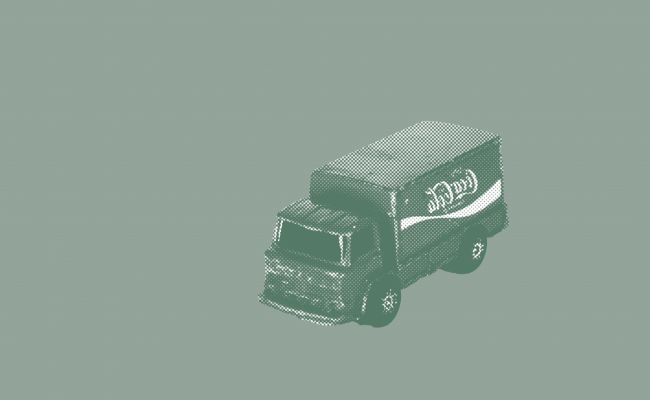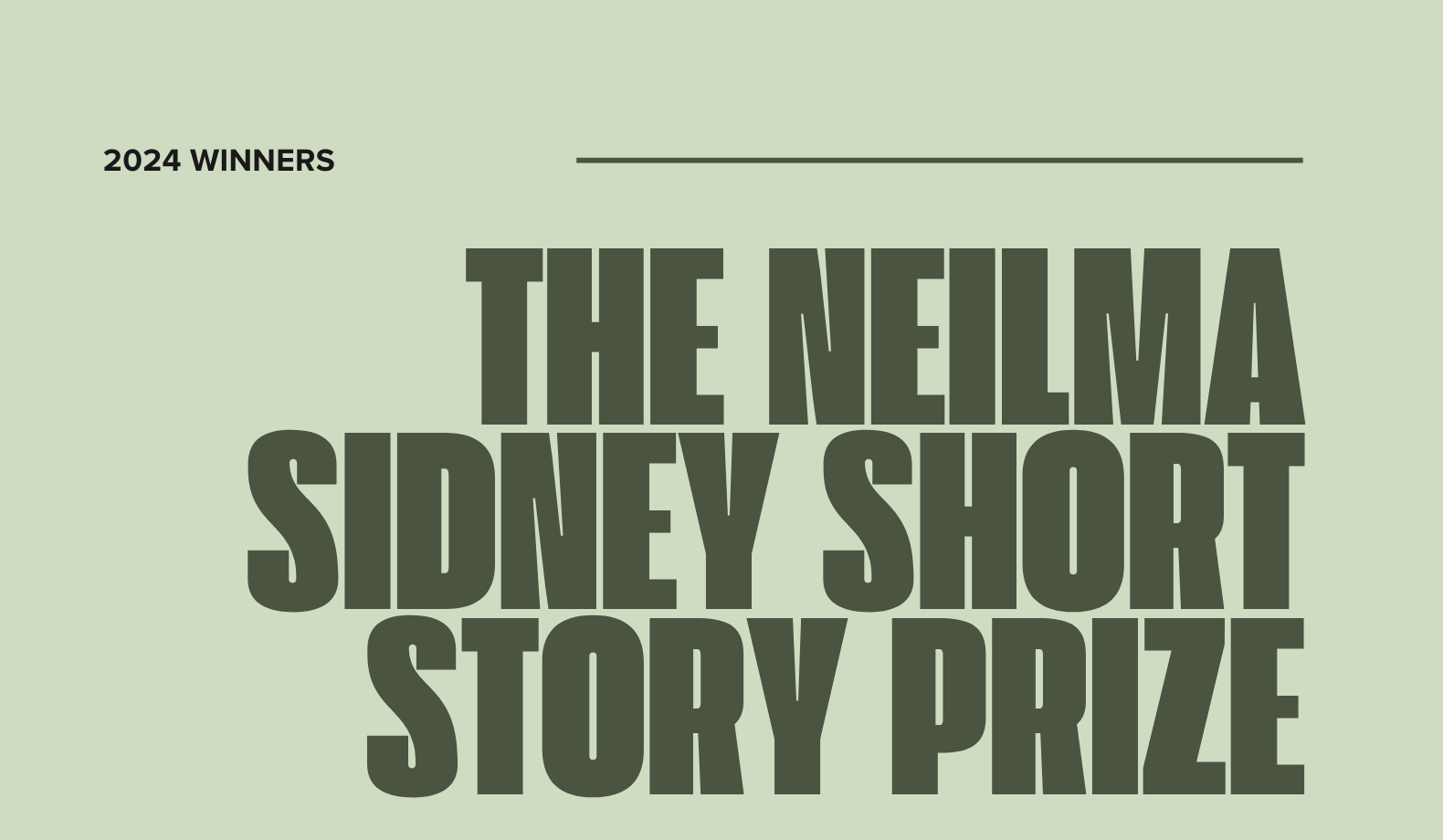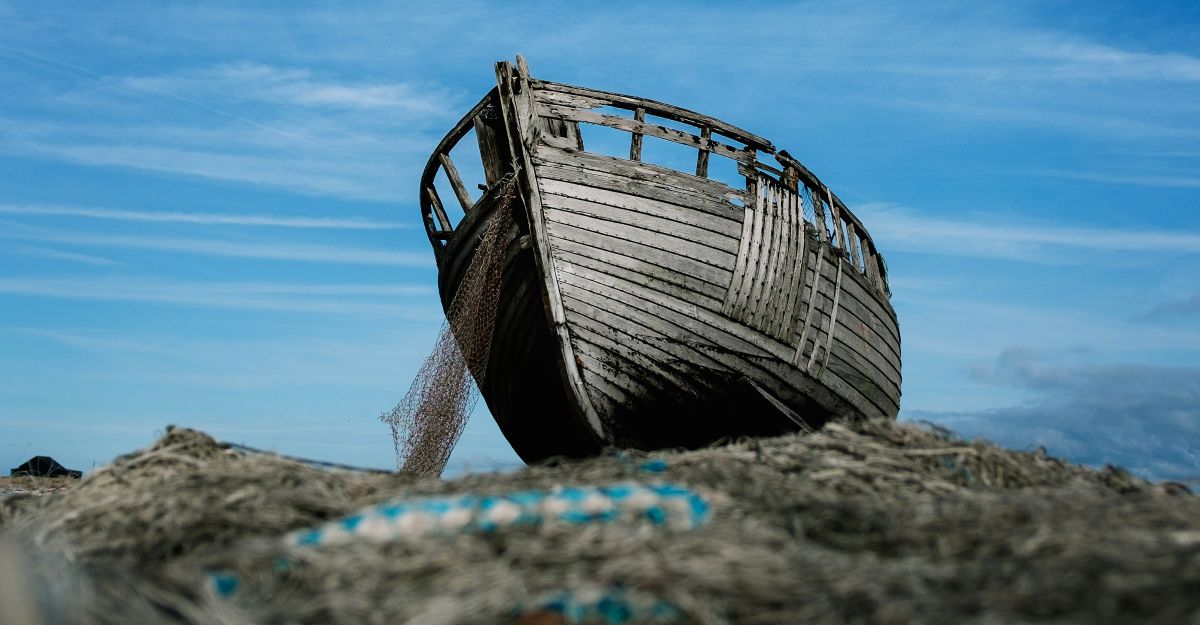You remembered the smell of him. Like milk powder, rimmed with the tang of compost. When you held him, you would breathe in deep, and squeeze him so tight he started to wiggle and huff. He came out smaller than a toaster, then took on the shape of a loaf of bread. Now, he was just starting to get lanky. Knobbly knees and feet so big in their fat, laced shoes, still round-toed. There would be a point where his shoes started to point at the tips, pressing his feet towards adulthood. He would never be so well balanced again. You were missing the shoes changing shape. You were missing him.
The last time you phoned in, backlit so your ears glowed, he had frowned. You watched him stare off-screen at your wife, his face so open and scared, waiting for affirmation.
‘That’s not Daddy,’ he said, and your heart broke.
‘You just haven’t seen me for so long,’ you said, and smiled. ‘Here, look at me like this.’ You made a box of your hands and framed your head. He laughed, then.
‘Daddy has a square-shaped face!’ he said and you pretended at mock offence.
‘A square-shaped face? Who says?’ You could hear your wife’s soft, sad chuckle. The way it came from deep in her throat, where other noises were, too, that had brought you joy to hear and sadness to recall. When you spoke to her, it was mostly in silences. There were no new words for the ache of it, so you sat and breathed together. Your words were for him; your quiet was for her.
The truck rumbled underneath you. Your hands told of diesel and oil and the elegant slice of a paper cut. Your clothing smelled like sweat and salt, and the deep fug of cardboard stacked too close: musty and stale. The bright tang of sticky tape, too. At your feet rolled three crumpled water bottles. None contained water. One was two-fifths full of piss. When it spun towards you, you kicked it away. It came back every time you turned left.
There had been a time, you were sure, when your insides hadn’t hurt. Before the lump in the back of your throat, the skewer below your heart, the dispersed throb of your intestines. Gastritis. Gatorade and stress. Sometimes, when you woke, your heart was thundering so fast you thought it might gallop right out, tearing your shirt. It would kick through the boxes and hammer down the street. Looking for a field, probably. It would need to run for a long time to find one.
Even when you dreamed, you dreamed of driving on an enormous treadmill, flanked by rolling canvasses painted with apartment buildings and high rises and padding homeless dogs and drooping power lines, rolling over and over. In the dreams, you were trying to read the name on a package, but it wouldn’t come into focus, and you were trying to keep your eyes on the road and on the box at the same time. You knew that someone might step in front of the truck at any moment, but if you pulled over, you would lose time, and that meant you would have your pay docked.
The misery of the circumstance was ineffable, unstoppable. You would wake and imagine a large house, with waxed timber floors, and huge windows, and air that didn’t sting to breathe. You would imagine your son tumbling into bed with you, and burying his nose in your armpit, and saying, ‘This is the smell of my father.’ A pot of tea. Buttered toast. Rice that never went bad. And your wife, that deep catch in her throat, laughing at the foot of the bed.
Sometimes, you would drive for a week and not see a green that was growing. Neon tubes, sure. Paint turning to rot. Rarely was it something alive. Once, you saw a pelican, glorious, enormous, sailing over the steel and concrete and glass. It landed so elegantly on a building’s lip and plunged its face into a bucket of laundry water there. You idled the truck to watch it. A beep sounded behind you. You watched the pelican jerk its head to the sky. The sail of its beak sagged over its neck and then its breast was wet and soapy. There was a hole, torn in the pouch of its beak, a rough, ragged hole like a burst balloon. The water poured out of it. More horns behind you. The pelican was dunking into the bucket, over and over, and you felt the cage of your chest press tight. You watched it in the rear-view mirror as long as you could, until the GPS beeped and you turned, and it vanished.
It was only a few seconds that you’d paused to watch the bird, but your last delivery was late. Only a little thing, a box the size of your fist, mummified in tape. They would deduct the value from your day’s pay. You balanced it on your palm before you walked up the five flights to deliver it. You prayed it was a small thing. Not jewellery. You imagined it was an apple, wrapped up tight, shipped fast before it went sour. No telling what it might be worth, now. Your sense of everything was slipping. You knocked on the apartment and left the box on the mat. You wouldn’t let yourself turn back once the door opened.
The next month, as the summer sweltered, and you sweated so hard you didn’t need to piss, the road shimmered and your eyes swam. Another truck passed you, driving in the opposite direction, and you raised a hand to greet whichever poor bastard was driving, but when you peered through the windscreen, there was nobody there. You might have been mistaken. The heat, the flash of sun. You could have sworn, though, that there were no hands on the wheel.
You were red-faced and lined on the screen that night. Your son giggled and told you that you looked silly, and his words were precious. When your wife took the phone back, she pressed a hand to her breast, and you knew without her saying that the milk was gone. You told her with your eyes and the catch in your breath that you were working so hard for them both, and she told you with her sniffs and the snag of her tooth that she knew it. You wanted to bite her shoulder. You wanted to hook your wrist under her breasts and pull her in close so you could breathe into her neck. You wanted to be kicked in the face by your sleeping son. You wanted the violence of their proximity. You slept in the truck.
At the warehouse, an unfamiliar man was loading up at the next bay. You hadn’t known the previous guy’s name. You’d just had an impression of his face: the thick ears of an old boxer, greying stubble. You knew without having to ask that he was dead. Nobody took days off in this job. Nobody retired. You hoped he hadn’t been driving at the time. No need to take anybody else out with him. You hoped it had been quick. It often was. Heart attacks, usually. Aneurysms. Strokes. Big, explosive things with blood inside.
During the first few phone calls home, you had repeated words like a mantra. It’s hard work. Of course, it’s hard work. We’re all working so hard. But it’s so our boy can have a life that’s easier. Because we worked so hard, he will live well. His life will be milk and honey, walking through this world we have built with our sweat and our tired hands. All of the children, think of them! Their leisure! How sweet the air will smell to them. By now, you knew. You knew that your children would not have better lives than you. You knew that the harder you worked, the more would be expected of them. You felt the pull of the maelstrom, and you could not swim away from it.
On the streets, with the truck crawling, you peered at the dead eyes of the workers in the convenience stores and offices, the men pulling themselves out of the sewers and driving rivets into steel, the women falling asleep on their feet with a baby in their arms, or running in high heels, swerving to avoid the cracks in the pavement, and you thought stop! Oh, stop! We’re hurrying towards nothing! They never stopped. You never stopped, either.
You found a toy in the truck. A tiny thing. A model of a man in armour, holding a sword, both hands on the hilt. He looked like he was ready to drop to his knee and receive a knighthood. You didn’t know where the toy had come from. Must have worked its way out of the corner of a box, a badly packaged present. It made you nervous. You shoved it in the glove box and watched for the deduction on your pay, but either nobody had noticed or they’d had the grace not to report the thing missing. Perhaps it had been sent to a child along with so many others that its loss was never noted. Maybe a whole army. When a few weeks had passed, you wedged the little figure into a fissure in the dashboard. At first, he stood watching you, valiantly, but you soon turned him around so he could see out the windscreen. He made you feel a little braver. The two of you, setting forth each day. When your stomach cramped or your eyes swelled up with salt and lack of sleep, he stood erect, ready. You liked him. It felt good to have a companion.
There wasn’t even time for the whispers to spread. You pulled your battered truck into the warehouse bay, where it sat, ticking and smeared with dust. You couldn’t park in your usual spot because a van waited there already. White. Alarmingly clean. More vans were parked on either side, so neatly, as if someone had brought out a set square to do it. The van in your bay shimmered. You could tell that when it started up, it wouldn’t roar. It would hum. The back doors stood open. The insides smelled of plastic and air freshener. You looked around for the driver. Nobody, just silence. Silence and the rows and rows of vans.
A few other trucks pulled up, dented and old. Men like you got out. You all stood, watching.
A tense stillness settled, punctuated by the flick of cigarette lighters, the hiss of exhaled air, a scuffed shoe in the dust. The warehouse doors were closed. No sound. The sun was well up by now, reaching harsh fingers across the asphalt. Someone coughed. You waited. You all waited.
After an hour had passed, one of the drivers turned on his heel, cracked open the door to his truck and swung himself in. He fired up the ignition and drove away. You watched the profile of his face through the glass: impassive, eyes fixed forward. You all watched him go, and then, when he had turned the corner, you all let your shoulders drop, just a little, and you followed him out. You spoke to no-one. You made no eye contact. You followed the truck in front until you were outside the gates, and then you just drove and drove, turning pointless circles on the pockmarked roads. On every wall, air conditioning units pissed out water and old shirts flapped in the wind. The power lines strangled their poles. You drove until the truck ran out of fuel, shuddering and stalling and finally wheezing to a halt. You pulled over in front of a laundromat and left the truck there, swaddled in steam. You pocketed the key but left the doors unlocked.
The little snuffling noises of his sleep were deeper than you remembered. His limbs so long, tangled in sheets, his feet splayed across the mattress. You bent down to his head, his downy hair grown long and thick. It stuck to his scalp a little, with the sweat of night. You took a deep breath in. His smell had changed. It had lost the milky sap of babyhood. His fontanelle had closed up, glazed over with bone. So much you had missed. You could smell snot and dirt and spit. He was earning the rank odours of manhood already. You didn’t want to wake him, so you stuck your lower jaw out to mute the sound of your sobbing. When you looked up, your wife was standing at the door. As she recognised you, her arm fell slack to her side. You could see the glint of light in her hand, the blade of a kitchen knife. You wiped your cheeks, whispered, ‘You trying to kill me now, woman?’ and she pushed her jaw out too, so the laughter and tears could exit as air. You stood, either side of your boy’s little bed. The air was thick with shame and love and fear. You couldn’t have moved if you tried.
Read the rest of Overland 245
If you enjoyed this piece, buy the issue




